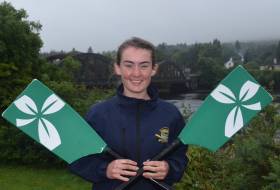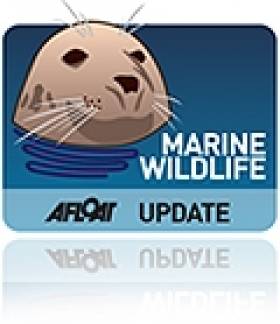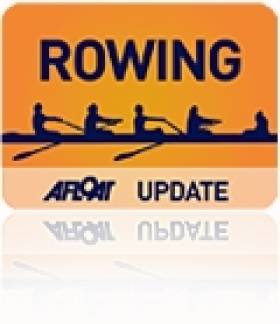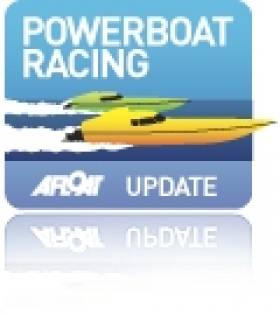Displaying items by tag: Kenmare
Enniskillen and Kenmare on Song at Castleconnell Head
#Rowing: Enniskillen, Kenmare and the host club all had notable results at the giant Castleconnell Head of the River today. Enniskillen’s girls’ eights were fastest at junior 18, junior 16 and junior 15 level – and their junior 18 women’s quadruple also hit the mark. The top junior 18 single sculler was Eabha Benson of St Michael’s. Georgia O’Brien was the top senior single sculler.
O’Brien is a Kenmare woman, and her club of origin had two remarkable results. Tom Kelly won the junior 18 singles and teamed up with 16-year-old Rowan Glynn-Johnston in the junior 18 double sculls to record a brilliant time of 11 minutes 12 seconds. Kealan Mannix of the University of Limerick was the fastest senior with a time of 11 minutes 52 seconds.
Enniskillen’s junior men’s eight were the fastest of all, in nine minutes 58 seconds, while UCD B were the fastest four with a time of 10 minutes 21 seconds.
#Rowing: Seven different clubs won in the second session of finals on the second day of the Irish Championships. The races were run in hot sunshine.
Two women's finals senior finals were won in emphatic fashion. Georgia O'Brien of Kenmare won in the women's senior single sculls to give the club its second Championship. NUIG were also well in control in their victory in the women's senior pair.
Sadhbh Scully of Carlow, who is a junior, followed the trend in her big win in the women's club single sculls.
The women's junior 18 eights was a tighter affair, though Bann, once in the lead, held on strongly to rebuff Enniskillen.
The men's junior quadruple was a big event, with Lee taking the title ahead of Three Castles and Neptune.
Cork clubs are having a good Championships, and UCC took the women's club eights.
Skibbereen figured strongly in some finals, but had their first Championship win when Kealan Mannix won the intermediate single sculls from Shane Haugh of Castleconnell.
NUIG and Enniskillen Shine at Irish Rowing Championships
#Rowing: NUIG had a very good first day at the Irish Championships at the National Rowing Centre, taking four titles.
They won the women's senior four, the women's intermediate eight and the women's club coxed four. Sadhbh O'Connor and Fiona Murtagh added the women's senior double sculls for the Galway club.
Enniskillen took two notable titles: their men's junior eight came through under pressure from Colaiste Iognaid, and the women's junior four won from Bann.
Fionnan Crowley retained his title in the men's senior single sculls. The Castleconnell man - a brother of Aileen, who was doing well in the Ireland pair at Rotterdam - won by under a length from Niall Beggan of Commercial, who came at him hard in the closing stages.
UCD's senior four also successfully defended their title.
Tom Kelly won the junior single - the first Championships for the Kenmare club. Kelly, who turns 17 next month, is coached by Noel Casey, who is 85. Casey as based in Britain for decades and coached British women's crews to the Los Angeles Olympic Games.
Carlow's Sadhbh Scully and Ciara Egan won the women's junior double - a first title at this level for the club.
Trinity won the men's club eight in a good race, while Cork Boat Club won the men's intermediate coxed four, and Anna Liffey the women's intermediate pair.
NUIG pushed Queen's hard in the men's novice coxed quadruple, but the Belfast men came through. The women's novice coxed quad from Queen's also won, giving them two victories on a busy day.
#Rowing: Georgia O’Brien has been chosen to represent Ireland at the Coupe de la Jeunesse. The Kenmare girl was added to the team, which will compete in Belgium on July 29th and 30th, after Cork Regatta. However, Rory Quinn and Oisin Clune, who had been in the mix for the Coupe de la Jeunesse team, were not chosen. They have been named in the team for the Home International Regatta in Scotland on July 22nd.
| Junior Team selections 2017 |
|---|
| The following junior teams have been selected to race at international regattas this coming summer. |
| Junior World Championships (Trakai, Lithuania, August 2-6) |
| JW2x |
| Margaret Cremen (Lee Rowing Club) |
| Aoife Casey (Skibbereen RC) Coach: Dan Buckley (Lee RC) |
| (Eleanor Casey, Skibbereen RC will travel with the crew as chaperone). |
| Coupe de la Jeunesse (Hazewinkel, Belgium, July 29-30) |
| JM4x- |
| Barry O'Flynn (Cork BC) |
| Matt Dundon (Clonmel RC) |
| Jack Keating (Carlow RC) |
| James Quinlan (Castleconnell BC) Coach: Ray Morrison (Fermoy RC) JW1x Georgia O' Brien (Kenmare) Coach: Ray Morrison (Fermoy RC) |
| JW2- |
| Ellie O' Reilly (Fermoy) |
| Gill McGirr (Fermoy) Coach: John Walsh (St Joseph's RC) |
| JM4- |
| Nathan Timoney (Enniskillen) |
| Barry Connolly (Cork BC) |
| Ross Corrigan (Enniskillen) |
| Aaron Johnston (Enniskillen) Coach: John Walsh (St Joseph's RC) |
| Home International (Strathclyde, Scotland, July 22) |
| Junior Women - Sweep Team |
| JW 4+ |
| Siobhan Maxwell (Commercial) |
| Aishling Keogh (Commercial) |
| Mia Kovacs (Shandon) |
| Chelsey Minehane (Shandon) |
| Cox: Vicky Hanlon (Cork BC) |
| JW4- |
| Mia Jane Elliot (Enniskillen) |
| Zoe McCutcheon (Enniskillen) |
| Caitlyn Fee (Enniskillen) |
| Miriam Kelly (Enniskillen) |
| JW2- |
| Megan Tully (Shannon) |
| Megan Carmody (Shannon) Coach: Fran Keane (Presentation College RC) |
| *The JW Eight will be a combination of the 4+ and the 4- |
| Junior Men - Sweep Team |
| Olly O' Toole (Commercial) |
| Edward Meehan (Commercial) |
| Michael Lynch (Commercial) |
| Ewan Jarvis (Commercial) |
| Tom McKeon (SMRC) |
| Dylan O' Byrne (SMRC) |
| Odhran Donaghy (Enniskillen) |
| Jack Dorney (Shandon) |
| Calum MacRae (Methodist) |
| Alexander Wilson (Methodist) |
| Cox: Rory Farragher (Enniskillen) Coach: Stewart Davis (Lee RC) |
| Junior Women - Sculling Team |
| Cliodhna Nolan (Carlow RC) |
| Ciara Browne (Workmans) |
| Anna O'Sullivan (Fermoy RC) |
| Ciara Moynihan (Workmans) |
| Aoibhinn Keating (Skibbereen) |
| Ella Buckley (Lee Valley) |
| Ruth Carson (Bann) Coach: Amy Phelan (Colaiste Iognaid) |
| Junior Men - Sculling Team |
| Aaron Christie (Bann) |
| Tadhg McKnight (Three Castles) |
| Andy O' Toole (Carlow) |
| Ross O' Brien (Carlow) |
| Alex Byrne (Shandon BC) |
| Rory Quinn (Three Castles) |
| Oisin Clune (Three Castles) Coach: TBC |
Tributes To Kenmare Man Drowned After Canoe Capsize
Tributes have been paid to the Kenmore man who died after his canoe capsized on Sunday (31 January).
As the Belfast Telegraph reports, Bill Topham was canoeing with a friend to islands in Kenmare Bay for a duck-shoot when their two-man vessel overturned in high winds as Storm Henry swept in from the Atlantic.
While his friend was able to swim to shore a few hundred yards away, Topham disappeared – and his body was recovered the following morning (Monday 1 February) after hundreds turned out to help with the search in often stormy conditions.
"Bill Topham and Kenmare, they sort of almost defined each other - willing to help everybody, always there and ready," said Rev Michael Cavanagh of St Patrick's Church of Ireland of the electrician, survived by his wife and three children.
The Belfast Telegraph has more on the story HERE.
Beached Minke Whale Is Furthest Inland Ever Recorded
#MarineWildlife - A minke whale who beached along a river far upstream from Kenmare has been rescued thanks to the timely response of locals.
As RTÉ News reports, it's believed that the whale - found some 3km from the Kerry coastal town along the River Roughty – is the deepest inland such marine wildlife has ever been found in Ireland.
Two local boats guided the lone whale back towards the sea after tireless effort by community volunteers to keep it alive out of the water during low tide.
Portora Turn it up To Eleven at Athlone Regatta
#ROWING: Portora won the Stephen Doran prize for best club at Athlone Regatta on Saturday. The Enniskillen club won a remarkable 11 finals, including clean sweeps of the men’s and women’s junior 18, junior 16 and junior 15 eights – with Bann of Coleraine coming in second in the junior 18 races. Portora also won the junior men’s coxed four and junior women’s coxless four.
The men’s senior single sculls winner was Turlough Hughes of UCD, with Damien Kelly of Garda second. Conor Carmody of Shannon won the junior 18 single sculls.
Kenmare celebrated their recent affiliation to Rowing Ireland by recording their first win – in the men’s noviced coxed quadruple sculls.
Dromquinna Manor Hosts Motorboat Weekend
Hugo Montgomery Swan, the editor of Powerboat & Rib Magazine is part of the line up at Dromquinna Manor's Motor Boat Weekend this May bank Holiday at Kenmare, Co. Kerry. Dromquinna's John Brennan promises a weekend 'filled with adventure and activities' dedicated to motor boat enthusiasts on Kenmare Bay. The weekend format is below. A pdf flyer is also available for download below.
Friday
7pm Welcome Reception at Dromquinna Manor
Speaker Hugo Montgomery Swan Editor of Powerboat & Rib Magazine Organiser of Round Ireland Challenge 2013
9pm Tom Crean Restaurant - Explorer Dinner
Hosted by Tom Crean's grandaughter who will tell of his epic voyages following
dinner. €35 Reservations 064 6641589.
Saturday
10am Navigation Workshop
11am Mechanical Workshop with Marine Motors Cork
12pm Basic Safety Demonstration
1pm Launch of 'The Men's Shed' Curragh
Blessing of the Boats
2pm Treasure Hunt on Kenmare Bay
A leisurely fun filled excursion on Kenmare Bay
6pm Helens Bar Kilmackillogue
Optional night cruise back to Kenmare
Sunday
7-9am Refuelling
10am Bull Run for Fun
The famous annual outing to The Bull Rock
Lunch in Portmagee at own expense
Afternoon Cruise to The Skellig Rocks
Return to Dromquinna Manor
Total distance 120 miles
7pm BBQ at Dromquinna Manor
€20. Reservations 064 6642888
Monday
Wash down and depart
Kerry Harbour Users Say No to Over-Regulation
#IRISH HARBOURS - Protesters took to the water off Kerry's piers last month in an organised swim drawing attention to proposed harbour bylaws designed to regulate the activities of water users.
“We need to make the public aware they have to make submissions,” Denise Collins told The Irish Times from Kells, which hosted one of the largest swims. “Traditional activities such as swimming will be over-regulated, we fear.”
The proposed bylaws would give Kerry County Council greater control over 16 of the county's 57 harbours and piers, including Kells, Kenmare, Portmagee, Brandon and Ventry.
Under the new bylaws, strict regulations would be placed on the use of loudhailers, landing and unloading passengers and freight, waste and even movement around the harbour.
"Draconian" charges are also set to be imposed on fishermen and other harbour users, while campaingers also feel that a ban on swimming and diving could also be added to the list.
The proposed bylaws already suffered a set-back earlier this year when Kerry County Councillors decided to restart the consultation process to allow the fishing industry, tourism operators and other interests more time to make submissions.
According to the Irish Examiner, only two submissions had been received by the council as of its January monthly meeting, despite senior council officials working for months on the draft proposals.
Cllr Toiréasa Ferris commented that the proposed charges in particular "would have huge implications for fishermen, some of whom might currently be earning only between €40 and €50 for a 14-hour day."
As previously reported on Afloat.ie, charges may also soon be hiked on yachts berthing at Ireland's main fishing harbours, a list that includes Dingle in Co Kerry.
Irish Marine Federation chairman David O'Brien expressed concern at the potential for such charges to damage "the good tourism dividend for coastal towns", noting that for every euro spent on a harbour berth, €10 was normally spent in the locality.


























